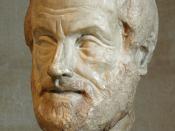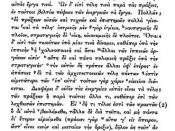While Aristotle makes some valid points in his argument for participating in the polis, Epicurus offers us the total package, which will, in the end, provide the citizens with a more "pleasant" life overall. This pleasantry without the pageantry of politics will aid in the living of a life that is ultimately more satisfying to the individual, and those around him. We will come to realize that we are not "Political animals" as Aristotle puts forth as validation, but merely creatures seeking pleasure and happiness. These very satiable appetites can be met without the punishing of the society as a whole, nor the total isolation of its individuals. With these proofs being met, we will see that Epicurus offers us a much more realistic and attainable society than conceived by his counterpart, Aristotle.
As was aforementioned, Aristotle believed "Man is by nature, a political animal". We have an inherent desire to participate in politics and this desire should be satisfied.
Aristotle points out that all relationships: Man and wife, Man and child, Man and slave, and Man and property, should have the soul purpose of relieving the man of burden so he may focus on politics. Aristotle doesn't see politics as a part of life, but a way of life.
In his writings he states, "If liberty and equality, as is thought by some are chiefly to be found in democracy, they will be best attained when all persons alike share in the government to the utmost." In other words, everything in life should fall second to politics. All relationships, with our wives, children, slaves, and property aid us in this participation, and we are all the better for it. Aristotle thinks this city-state centered life will bring us true happiness.
Epicurus begs to differ. He believes that "Pleasure...


